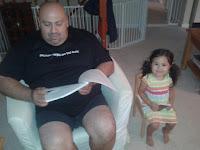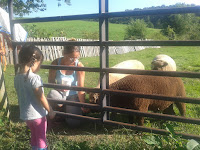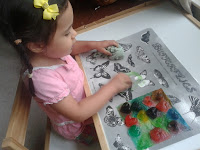This week was a lot less structured, if you can call the first three weeks structured to begin with. Trying to scale back on the premature formal academics and instead focus on habit formation, in particular independent play.
LANGUAGE ARTS
No formal sit-down reading times planned. Going through her book rack before swapping books and asking what she likes and doesn't like. If there's a book she says she likes and I know she's looked at it multiple times that week, I'm keeping it in the rack for another week. If she doesn't like the book, and I don't particularly like the book, we are not going to be keeping it. So far, we haven't agreed much on this, so either I could stand to get rid of the book but she says she likes it, or she says "eh" but I really like it and think she'll come back around to it (or her brother will like it).
Also, adding longer, paperback books to her potty bin has been very helpful, as we read these books the most frequently. Even though they're not displayed in any sort of fancy way, she still seems to remember after the first day of rotation what's in there and sometimes asks for a book that's from a different week's rotation.
One newish thing we've been trying to do is add reading as part of bedtime, so when she may not want to go to bed just yet, but we want her to be winding down, so we "allow" her to pick a book or two or three to bring to one of us to read to her. ( One day, after I initially said she could pick one book, once she had it in her hand, I said she could pick two, so she picked an additional one, totalling two books. Sneaky little math "lesson", eh?) This is turning out to be another great way to work read alouds into the day, and it shows which books she's really enjoying.
MATH
Ok, so since abandoning "formal" math "teaching", I think Natalia is teaching herself. When asked how many apples were left on the table for the next day, she went and counted "one, two, three" and reported back that there were three! Another day, she did the same with the accurate number (I think it was 2) again. So since this teaching-herself business seems to be working, we're going to stick with it. (I should note that leaving a tray of fruit that she can easily get to by herself is what encouraged this sudden urge to count, as well as increasing the whole family's fruit intake, as she practices sharing when helping herself, usually to an apple.)
That said, even though I decided not to count "rote counting" as a necessary skill anymore, she has nonetheless reached it anyhow. When asked to count, she counts in the "correct order" 1-10. In English. When prompted in Spanish, she counts in Spanish. When prompted in Polish, she counts in Polish.
I've started pointing out groupings in books and the like by saying how many of something there is without first counting them one by one. The idea is that she associate the number to the real world objects and doesn't think any given number is a "name" for an individual item.
 |
| Very cool color and light experience. |
I've been reading up on the Reggio Emilia approach to learning, and one of the things that appeals to me is the focus on light and color and shadows (hence my excitement over the shadows during our late night walk - see the science section below). We also found a neat lesson in observing the color shadows of her shape decals. She was intrigued by the fact that, according to the decal shadows, there were two ovals, but she knows we only have one oval, and one circle. She got up and went to the window to point out this fact!
SCIENCE
Natalia's nature corner gains her attention nearly every day. She gets her treasure box and looks through its content, sometimes with a magnifying glass, sometimes not. I'm trying to encourage her to use her bamboo placemat to keep things more organized. She also reminded me one day when I had forgotten and it was already lunchtime that we need to bring her plant out into the sun for the day.
One night we went walking, the three of us, once it was dark outside, to avoid the nasty heat. With the assistance of a flashlight, we were able to get up close and personal to some flowers, trees, bushes, but also to have some fun learning with shadows. Unfortunately, I have no idea how to capture shadows on photo. But she got a kick out of the giant Natalia with her braided pigtails walking ahead of her on the sidewalk and on fences! When we returned to the house, right before we went in, she found a slug in the grass thanks to her flashlight pointing. We spent another 10-15 minutes observing the snail, picking it up, watching it stay still and then start slithering on my hand. In the end, she finally braved it and touched the snail herself.
 |
| A great end to a late evening walk. |
FOREIGN LANGUAGE
Even though she hasn't been watching Signing Time daily (it's not "on the schedule" - I play it for her whenever she asks for it, since we don't have all the episodes purchased and are limited to what's available online), she nonetheless is using the new signs she picks up throughout the day. This morning, when Oscar came in to cuddle, upon waking she signed to Daddy in response to something he asked, even before saying anything. Of course now it escapes both of us what that sign was!
CRAFTS & SENSORY
So this was one of the few things "on the schedule" for the week. The artsy idea was a flop. We did crayon rubbings of various textures, but it was mostly me showing her what crayon rubbings were, and then she was ready to move on to something else. So she didn't care for the crayon rubbings or the textured pieces in themselves either. I left the whole set up on her little table for hours, but she never went back to it.
 |
| The flop - crayon rubbings and textured material. |
I also gave her a little box of various beads and pompoms, with the idea of this being a sensory experience, but she quickly realized the beads had holes in them, and wanted to make a necklace. (She's played with these same beads many times before, but this was the first time she took note of the holes!) I gave her a few small pipe cleaners and helped her thread a couple on, and she was able to work on this without assistance for a good 10 minutes. We made a necklace and a bracelet for one of her toys. She also remembered that there were a few other beads on a necklace elsewhere in her room, so she went to get it and asked me to untie the ends so that we could add those beads to her box. I'm going to need to get better pipe cleaners for her to work on this, as the ones I have are Christmasy, and as such sparkly and a bit messy, plus not very soft.
 |
| The success: we will be adding more threading activities! |
Also under sensory activities, we have to include water play. This week, this was limited to bath time, during which time she did some "swimming" practice (laying in the water and blowing bubbles into the water), but also squirting with some bath animals, washing her plastic dinosaur, and sticking foam letters onto the side of the tub. When putting them away, she's shown she recognizes a new letter -"W", and counts the items as she takes them out - language arts and math without ever being on the schedule!
Natalia has also started to show a bit more interest in her easel, especially since I rearranged her playroom a bit and it has been left out, right by the door to the room. (It was previously inside the closet next to her doll house.) Almost daily, I see that she has stopped to draw or write something on the blackboard. I'm careful not to guess what it is, and instead, ask her. I'm getting some pretty creative responses.
 |
| This is a picture of "ongos" (mushrooms) that we had observed in the yard earlier that day. |
PHYSICAL FITNESS
This is really a section for me to stay accountable rather than her. At her age, it takes effort NOT to be running around burning off calories all day long! But since I've become intentional about fitting prenatal yoga into our daily routine, Natalia has started joining me in some of the poses. I follow a YouTube video, and sometimes she compares what I'm doing to what the instructor is doing and corrects me! At times, I can hear her taking in slow, deep breaths. Other times, she just plays in the vicinity and waits for my practice to be over.


One time, when I was using a yoga ball, she came up behind me and placed her hand on my back, saying "relax, peace, good" - cues that she's learned from participating in a HypnoBabies script Oscar was reading to me, in preparation for birth. (Perhaps not exactly "physical fitness" in the traditional sense of the word, but certainly in the realm of health :) )
 |
| Ready to read my HypnoBabies script with daddy. |
SOCIALIZATION
She had two Skype sessions this week, one with my mom and another with my grandmother and aunt. This also reinforced her Polish. In addition, we went to a restaurant for dinner one night, to church, and we had some friends over the house yesterday. Even though the adults mostly spoke among themselves, she was able to introduce her "friends" (toys) to our guests, and charmed one of them into playing especially well with her. There was a little girl, about 10 months old, also here, so they enjoyed the air coming out of the A/C vent together. She had also planned on scaring one of our guests with the assistance of her dinosaur, because I had mentioned to her that this friend enjoys being scared (which she said she does). So she looked forward to the get-together and got a real kick out of yelling "boo" as if the dinosaur was saying it. She practiced greeting our guests and saying goodbye to them and taking turns at the table and in conversation.
When everyone left, I was able to reflect on the importance of Natalia referring to these adults as HER friends. And why not? Why would she be limited to only friends her own age? We don't impose such restrictions on adults! So I'm feeling very good now about our approach to socializing, without contrived same-age groupings that honestly, I think do more harm than good if not kept in check.
INDEPENDENT PLAY
This week, I removed all ideas of scheduled activities and focuses on encouraging independent play. I am happy to report that this "deschooling" of myself has already started to bear fruit. Here's what we're doing. First of all, I don't carry my phone with me everywhere I go, which would encourage constant checking and Natalia would just see me looking at a screen and be reminded of her own screen time. Second, if she was playing on her own and no one was in danger, I LEFT HER ALONE! I didn't join in. I didn't make suggestions. I didn't comment. I also didn't call her away from her play for meals or to start bed time. It seems that she plays independently the best towards the evening, but luckily I do not need to be at work in the morning, so we are flexible on when she goes to sleep.
Also, when she did want my participation in her play, I would humor her, but only minimally. I'd do my best to try to turn questions on their heads instead of giving her solutions. I literally found myself sitting on my hands and biting my lip to let her play how she wanted. At times, I had to go start an activity with her to gain her interest, and then I'd quietly withdraw. Once she was enthralled in her play for a while without coming to me for anything, I'd leave the room for a bit. If gone too long, she'd come looking for me, and I found that I couldn't get on the computer in the next room just yet. So I started to just sit in her room and read a book silently to myself. Or even across the hall in the bathroom with the door open!
On one occasion, she played like this on her own for a good hour! Another time it was around 45 minutes, and several sessions of 20 minutes or so. The biggest hurdle was myself. I'm so used to being hands-on when it comes to playtime, that it was difficult for me to just observe quietly. But I'm seeing the benefits, and the goal is for her to consistently entertain herself for at least a half hour at a time with me in another room. It seems that if I'm up and doing something - cleaning, for instance - she doesn't look for me. But the moment I sit down to the computer, she somehow senses that I'm "not doing anything" and stops playing independently.
HABITS
Aside from socializing and independent play, I've been trying to bring Montessori-inspired activities into our everyday lives, instead of concockting artificial experiences that are more appropriate for a preschool setting than home. Instead of giving her a tray with cutting as a skill to practice, I let her cut up all the mushrooms for our lunch one day. She followed that up with wanting to cut up some banana for her cereal on another day. I give her a plastic knife and leave her to her work.




Another daily new thing is letting her pour her own drink - usually water - at the table. I give her a small pitcher with what she's drinking, and let her fill it, drink, refill as needed. The first day, I only gave her enough to fill her cup half way. But the second day, I got brave and gave her more water than could fit in the cup, trusting that if she was paying enough attention to what she was doing, she'd know to stop pouring before it was too late. And she did! One time she literally caught herself with the water already bulging above her cup, looking to me for guidance on what to do next. I showed her how to slurp the excess off the top (!), and she hasn't overfilled her cup again.
Along the same lines, instead of giving her a scooping activity, which I've tried multiple times with very limited success with various materials (dry beans, dry pasta, rice, cornmeal), Natalia is in charge of feeding our dog, Bigos. She is still working on staying consistent with the correct amount to scoop, so this is a supervised activity. She can open the door to where the dog food is kept, she can open the bag of dog food, and she can scoop the food into the bowl, as we keep both measuring cup and bowl next to the food. However, we have to keep the dog away long enough for Natalia to prepare the meal, and then we have to open the gate for her to place the bowl where it goes. In the picture below, we were still mixing Bigos's old and new food, so we had a separate container.

She also has started to ask to floss - her own teeth and mine! She saw this in a Signing Time video.
CHARLOTTE MASON PRESCHOOL
This is the newest take I want to introduce into our preschool, very laid back, which I discuss in my previous post
here. Since I haven't had a chance to implement any of these ideas, them being brand new to me and all, there's nothing to say about it yet. But in future weeks, I will have a section on our progress in this area.











































